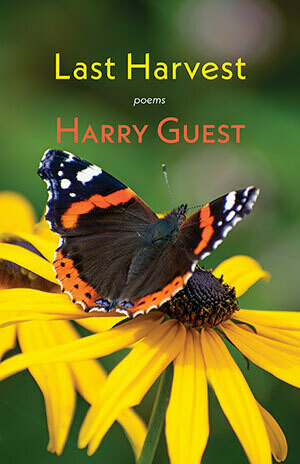Last Harvest
Harry Guest
(Shearsman Books Ltd, 2020); pbk £10.95
From the pages of Harry Guest’s collection of poetry emerge forests, fields of grass, Norwegian fjords, and nature-dwelling creatures. The title is poignant for it reflects on relationships, the passage of time, and a sense of place. Adding to a substantial oeuvre (poetry publications, several novels, and translations from French, German, and Japanese) Last Harvest presents a retrospective view of Guest’s life as it nears its completion.
Written in free verse and traditional stanzaic forms Guest experiments with a variety of metre, structure, and lengths. He engages an observational style of writing which leaves much interpretation up to the individual. Although light and humorous at times, his writing still expresses raw emotion and awareness of the fragility of life.
The collection begins by simplifying language and Guest explores a phonetical approach to poetry in ‘2175 A.D.’,
at.skul.wee.lern.short.wurdz.wiv.just.wun.sownd.
zer.wuns.hoo.teech.us.du.not.no.yuze.long.wurdz.
no.wun.duz.
Blurring together sounds and words in this short piece, this poem is distinctive in its style and its use of faster rhythms when compared with the rest of the collection. It might seem a curious place to begin but it highlights the capacity for unembellished language to convey significant meaning. The common theme that runs throughout this collection is the importance of communication in whatever form that takes.
Last Harvest clearly establishes Guest’s love of – and respect for – the natural world in his use of the imagery of the outdoors. Guest’s philosophical approach to time and morality exemplifies how:
He gave pure transience
a lasting life[.]
The poems immortalise intimate moments in nature that would otherwise be lost amongst the trees and rocks which he so meticulously describes. In ‘Stones Set’, stones are a motif of signifying permanence. Offsetting this metaphor against ephemeral elements in his poetry enhances Guest’s preoccupation with the passage of time.
Much of Guest’s poetry appears as a stream of consciousness. He makes remarks without pressuring the individual to interpret his writing or endow it with one specific meaning. Some poems gently wash over the reader while others address a more deliberate agenda. ‘The Approach of Future’ conveys the importance of relishing each fleeting moment of life, encouraging people to
Look back to the lost past.
Life came to some and us,
stays with a memory[.]
There are profound musings on the treatment of Earth and the meaning of life. Guest’s anxieties about the planet’s future – and that of those who inhabit it – are apparent, but there is also a sense of hope, as demonstrated in ‘Romantic’:
since otherwhere is always beckoning,
the grass more emerald, windows
far brighter, stars relied on.
Certain poems appear to issue a call to action for future generations. ‘A Quarter-Paradise?’ offers a succinct overview of the time and changes that Guest has witnessed while ‘No Books No Writers No Future’ reflects on what is at risk of being lost in terms of the arts and culture, suggesting that ‘It isn’t now the way things used to be’.
Last Harvest highlights the importance of the written word and tells us:
Confecting dreams requires a certain
blend of bland reportage and shameless
fantasy – cold eye and flaming pen.
Harry Guest’s poetry is deeply evocative and beautifully written, but also passionate and thought-provoking. Culturally relevant, it serves as both escape from and an active reminder of the world we inhabit.
Eilidh Henderson


Leave a Reply